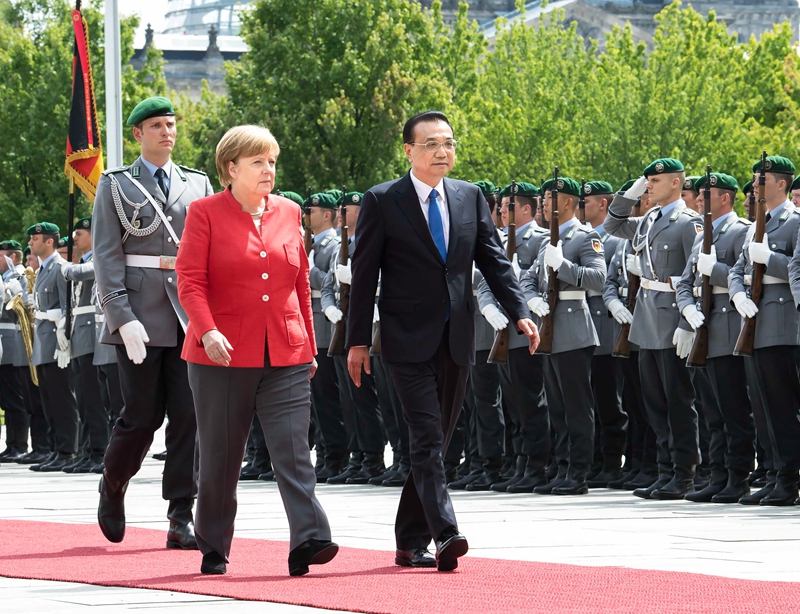Media Report

- CNBC reports: "China is looking to the European Union as its new best friend amid trade frictions with the United States. Prime Minister Li Keqiang met eastern and central European leaders in Sofia, Bulgaria, on Saturday, and vowed to open up China's economy to the wider world. Keqiang is also meeting German Chancellor Angela Merkel on Monday and next week, in Beijing, he will host an EU-China summit. "Opening up has been a key driver of China's reform agenda, so we will continue to open wider to the world, including widening market access for foreign investors," he said. "Countries are welcome to board China's economic express to share opportunities of China's development." Keqiang's comments followed another round of U.S. tariffs against China, instigated on Friday and worth $34 billion."
- Bloomberg reports: "Chinese are, in the popular imagination as well as some economic statistics, inveterate savers. According to the International Monetary Fund, the Chinese savings rate stood at an astonishing 46 percent in 2016, compared to a global average around 25 percent. Chinese planners have long sought to bring that ratio down in order to promote consumption and ease the economy's overreliance on investment. If only Chinese would shop more, the thinking goes, China wouldn't need to rely on smokestack factories and boondoggle infrastructure projects to drive growth. There's one problem with this theory, though: Chinese may not have as much money to spend as the headline numbers would indicate. For one thing, the official savings rate includes government-mandated social-security contributions. Other government surveys show that Chinese households only save about 29 percent of their actual income."
- Yahoo! reports: "Chinese exporters were scrambling Monday to cope with a plunge in U.S. sales while China's state press shrugged off the impact of Washington's tariff hikes in a spiraling technology dispute. The impact of Friday's tariff hikes on the world's second-largest economy should be limited, according to private sector analysts. But President Donald Trump's measures targeting Chinese medical, construction and factory equipment hit exporters that say price-conscious American customers have stopped buying. The general manager of a medical device exporter that makes 15 to 20 percent of its sales to the United States said he plans to fly there this week to negotiate with customers who stopped ordering its syringes and other equipment."
Calendar
- 2018-07-08 Chinese risks to global stability are overblown
- 2018-07-06 China Says U.S. Has Begun 'Largest Trade War' In History, Retaliates With Tariffs
- 2018-07-05 China says U.S. 'opening fire' on world with tariffs, vows to respond
- 2018-07-04 Trump tariff salvo triggers anxiety for US chipmakers
- 2018-07-03 China's big bond experiment is about to go through a rough patch
- 2018-07-02 Trump Trade War Arrives in the Data as China Awaits Tariffs
- 2018-06-29 State Department risks China's ire with request for US Marines in Taiwan
- 2018-06-28 Xi Warns Mattis China Won’t Surrender ‘One Inch’ of Territory
- 2018-06-27 Trump Backs Softer Restrictions on Chinese Investment
- 2018-06-26 Why markets don't like US investment restrictions on China
News
- Yahoo! Chinese exporters scramble to cope with US tariffs
- CNBC China attempts to get closer with Europe after Trump slaps new tariffs on Beijing
- Los Angeles Times U.S. warships pass near Taiwan in a show of defiance to China
- The Wall Street Journal A Stock Market Crash With Chinese Characteristics
- CNBC Asian stocks advance as tariffs take a backseat; China rallies
- The Wall Street Journal Tesla Buyers in China Are Early Casualties in Trade Wrestle
- CBS News China makes $8.46 from an iPhone. That's why a U.S. trade war is futile
- The Wall Street Journal For China, Tech Giant Tencent Is Both a National Champion and a Threat
- CNBC Asian stocks advance as tariffs take a backseat; China rallies
- CNBC Chinese tech giant Tencent plans to list its online music business in the United States
Commentary
- The New York Times Inside China's Dystopian Dreams: A.I., Shame and Lots of Cameras
- Bloomberg Chinese Savers Won't Save China
- The Hill China's currency depreciation should set off alarm bells
- Vox The impact of Trump's trade wars, explained
- Financial Times China's Belt and Road difficulties are proliferating across the world
- The New York Times China's Taste for Soybeans Is a Weak Spot in Trade War With Trump
- The Verge Trade war bumps up Tesla prices in China
- Tech Crunch China's Xiaomi makes underwhelming public debut in Hong Kong IPO
- Quartz The source of the mysterious ozone-killing emissions is confirmed: China